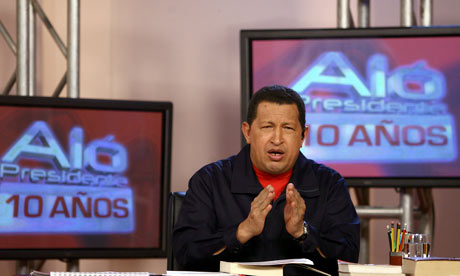President kickstarts cultural revolution with lecture on the importance of reading and handouts of political books Hugo Chavez delivers a speech during his second broadcast of the day in Caracas. Photograph: Presidencia/AFP/Getty Images Cultural revolution had been declared and the crowd jostled in anticipation of receiving the latest tool in President Hugo Chávez's effort to transform Venezuela: books. Government trucks were unloading crates of books in plazas across the country, some 2.5m volumes in total, and those gathered in the capital, Caracas, surged forward to collect their prizes. There were three titles: Social Movements in the 21st Century, Culturecide: a history of Argentine education 1966-2004 and Empire's Spider Web, a critique of US foreign policy. "This is brilliant. This is revolutionary process in action," said Justo Rico, 38, clutching the Argentine book. Would he actually read it? "Of course!" Cultural fervour seemed to be everywhere yesterday. Chávez started afour-day marathon edition of his TV show, Alo Presidente, with a lecture on the importance of reading. He wants arts and culture to realise Che Guevara's dream of creating a socialist "new man". In the slums, government-funded book clubs known as "reading squadrons" distributed copies of 100 "must read" titles by authors such as Karl Marx, the poet Andrés Bello and the theorist Rodolfo Quintero. "The cultural revolution has been fundamental in uniting the people of Latin America and deepening the region's anti-colonial instinct," said Abel Prieto, Cuba's culture minister and a guest of honour at a Venezuelan government seminar in Caracas. Government opponents are horrified. They accuse Chávez of marching South America's oil giant down the path to communism and tyranny. "Venezuela is on the way to becoming a second Cuba," said the Peruvian writer Mario Vargas Llosa, who was in Caracas for a rival seminar hosted by a conservative thinktank. Vargas Llosa warned that free speech would be stifled if Chávez implemented a threat, repeated yesterday, to close Globovision, Venezuela's last opposition TV station. In turn, the government warned the Nobel laureate not to make political statements. Despite the official hype, and opposition alarm bells, there is little sign of cultural ferment in Venezuela. The country is politically polarised but remains, according to surveys, united in its passion for soap operas, baseball and fiestas. Chávez has surged ahead with bold political and economic policies and funded internet access, community radio and TV stations in the slums. The government has also expanded an acclaimed classical music-training programme . But cultural initiatives that were to supposed to embody the transition to "21st century socialism" have faltered due to lack of funding and political will. Exhibitions, films, books and public art works have taken a back seat in the revolution. Several years ago the government announced it would build six new museums and merge existing ones under a single authority to end elitism and make them magnets for the poor. But only one new institution was built and established museums have stagnated. New works have not been acquired in more than five years, according to staff, and visitor numbers have fallen. When the Guardian visited the modern art gallery there were just two other visitors. "Museums have lost their autonomy and that is a death blow. Curatorial departments have been dismantled, there is no research," said Julietta Gonzalez, a former Caracas curator who now runs London's Tate Modern Latin American collection. Some exhibitions were politicised but that mattered less than corruption and bureaucratic bungling, she said. "The problem is mismanagement, not Cubanisation. There are a lot of people who just want to be hired to be close to the money and have perks. They have no interest in ideology, the only ideology for them is dollars." The culture ministry declined interview requests. Three years ago Chávez inaugurated a film studio, Villa del Cine, with the slogan "lights, camera, revolution". It has produced 12 feature films and hundreds of documentaries and shorts. "We are having an impact on society's values," said its head, David Rodriguez. However, vendors of pirated DVDs say there is little demand for the studio's output. Its budget for this year has been slashed by 40%, studio sets have been idle since November and a high-profile collaboration withDanny Glover about a slave uprising in Haiti has evaporated. Chávez is a bookworm but, compared with other South Americans, Venezuelans read few newspapers or magazines let alone books. Giving away 2.5m arcane titles seems unlikely to change that. The crowds jostling for free copies of Argentina's education history, it turned out, were mostly culture ministry employees bussed in for the occasion. "It's our duty to be here," said Marisol Aponte, 56, a co-ordinator in a government-issue red T-shirt. Inflation and exchange rate controls render ordinary books prohibitively expensive. Bookshops in Caracas are dowdy and offer meagre choice in comparison to those in Bogotá and Lima. Placenames that used to honour Christopher Colombus have been changed to reflect the official view that Europeans invaded – as opposed to discovered – the new world. The idea is to boost pride in Venezuela's indigenous origins and anti-colonial struggle. Three years ago a replica of Columbus's ship was banished from a park lake to make way for a theme park about the independence hero Francisco Miranda. There is still no sign of Miranda.Chávez distributes 'must read' books in effort to transform Venezuela

Saturday, 30 May 2009
Posted by
Britannia Radio
at
09:53
![]()





















